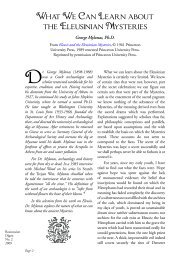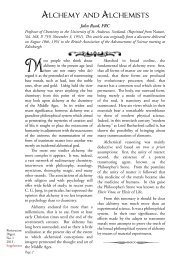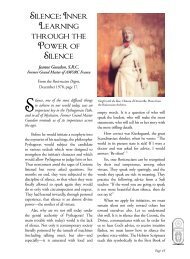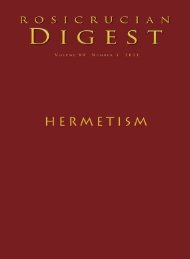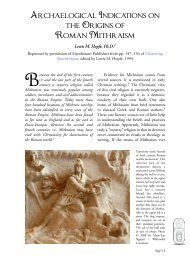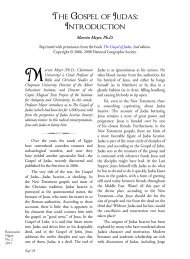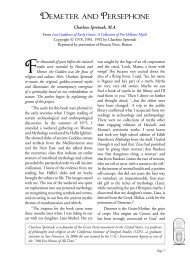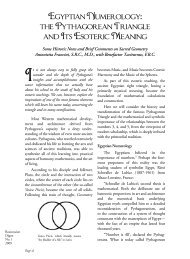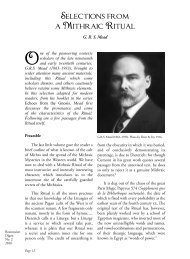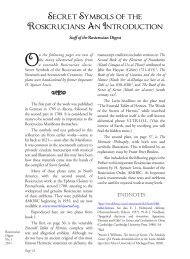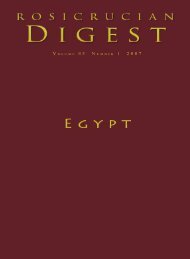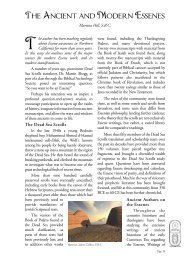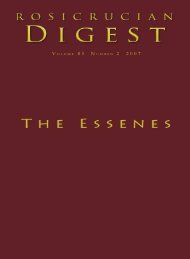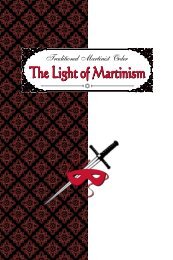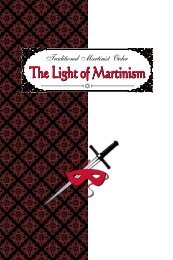Maxime Quintal, F.R.C. Reprinted from the ... - Rosicrucian Order
Maxime Quintal, F.R.C. Reprinted from the ... - Rosicrucian Order
Maxime Quintal, F.R.C. Reprinted from the ... - Rosicrucian Order
You also want an ePaper? Increase the reach of your titles
YUMPU automatically turns print PDFs into web optimized ePapers that Google loves.
<strong>Maxime</strong> <strong>Quintal</strong>, F.R.C.<br />
<strong>Reprinted</strong> <strong>from</strong> <strong>the</strong> <strong>Rosicrucian</strong> Digest, Vol.45, No.11 (November 1967), pages 428-430<br />
<strong>Rosicrucian</strong><br />
Digest<br />
No. 2<br />
2007<br />
Web<br />
Supplement<br />
he nature of <strong>the</strong> Essenes and <strong>the</strong><br />
Dead Sea Scrolls have continued to<br />
engage generations of seekers. This<br />
1967 essay adapted <strong>from</strong> <strong>the</strong> <strong>Rosicrucian</strong><br />
Digest, considers <strong>the</strong> mystical aspects of <strong>the</strong><br />
Essene tradition.<br />
There was eager anticipation in <strong>the</strong> years<br />
following <strong>the</strong> Second World War when <strong>the</strong><br />
Dead Sea Scrolls were discovered. It was<br />
a discovery that engendered a growing<br />
consciousness of a unique order shrouded in<br />
mystery for centuries. Who were <strong>the</strong> Essenes<br />
who referred to <strong>the</strong>mselves as “<strong>the</strong> sons of<br />
Zadok?” How did this mystical community<br />
evolve, and why?<br />
The etymology of <strong>the</strong> word Essene (a<br />
moot topic) is Egyptian. Truly it is derived<br />
<strong>from</strong> <strong>the</strong> word Kashai, which means secret.<br />
Also meaning secret and silent is a Jewish word<br />
of similar sound, chsahi,<br />
which is translated as Essene.<br />
The true origin of <strong>the</strong><br />
Essenes is in <strong>the</strong> strange<br />
land of Egypt, where<br />
initiates of <strong>the</strong> ancient<br />
mystery schools enacted <strong>the</strong><br />
Osirian mysteries in <strong>the</strong>ir<br />
temples; where “a secret<br />
gnosis” or “superiority of<br />
knowledge,” was transmitted<br />
by word of mouth to<br />
neophytes who were tested and found<br />
worthy, thus perpetuating an ancient<br />
tradition. In strict secrecy and confidence<br />
<strong>the</strong> Kheri-Hebs (Masters, Lector Priests)<br />
imparted to <strong>the</strong> seekers after truth <strong>the</strong><br />
esoteric wisdom, which <strong>the</strong>y received upon<br />
oath never to reveal to <strong>the</strong> profane masses<br />
nor to set down on papyri scrolls.<br />
Page xxii<br />
“From far lands<br />
students came to study<br />
philosophy at Thebes,<br />
Heliopolis, and<br />
Alexandria, where <strong>the</strong><br />
mystery schools had<br />
established branches”<br />
From far lands students came to study<br />
philosophy at Thebes, Heliopolis, and<br />
Alexandria, where <strong>the</strong> mystery schools had<br />
established branches. Many profound<br />
thinkers journeyed to Egypt; among <strong>the</strong>m<br />
were Solomon, Pythagoras, Thales, Plato, and<br />
Democritus. From Egypt this gnosis or<br />
esoteric knowledge spread to o<strong>the</strong>r lands<br />
during <strong>the</strong> centuries prior to <strong>the</strong> Christian<br />
era; in Greece were found <strong>the</strong> <strong>Order</strong>s of <strong>the</strong><br />
Therapeutae and <strong>the</strong> Pythagoreans, and, in<br />
Palestine, <strong>the</strong> Community of <strong>the</strong> Essenes.<br />
In <strong>the</strong> period between <strong>the</strong> Hebrew<br />
Scriptures and <strong>the</strong> Christian New Testament<br />
<strong>the</strong> Essenes of Palestine (<strong>the</strong>re was also an<br />
Essene organization at Alexandria) had<br />
already established a branch north of Engedi<br />
on <strong>the</strong> western shore of <strong>the</strong> Dead Sea. Flavius<br />
Josephus, <strong>the</strong> Jewish historian, states that<br />
Essenes were to be found in every city …<br />
They were not a religious<br />
sect, as is often claimed.<br />
However, <strong>the</strong> Pharisees and<br />
Sadducees would have<br />
regarded <strong>the</strong>m as such, since<br />
Essenic doctrines differed<br />
considerably <strong>from</strong> those of<br />
<strong>the</strong> former.<br />
Their spiritual head was<br />
referred to as <strong>the</strong> “Teacher<br />
of Righteousness” and <strong>the</strong><br />
community looked upon him as a Messiah<br />
(Mashiah) or “Anointed One.” Essene<br />
commentators in <strong>the</strong>ir exegesis interpreted<br />
<strong>the</strong> Suffering Servant passages of Isaiah to<br />
refer to <strong>the</strong>ir own Teacher of Righteousness.<br />
The passage <strong>from</strong> <strong>the</strong> Book of Habakkuk 2:4,<br />
which reads, “…<strong>the</strong> just shall live by his faith,’<br />
which <strong>the</strong>ologians interpret to mean Jesus, is
in <strong>the</strong> Qumran manuscript interpreted as<br />
“<strong>the</strong> just shall live by <strong>the</strong>ir faith in <strong>the</strong><br />
Teacher of Righteousness.”<br />
The ancient historians Philo of<br />
Alexandria, Pliny <strong>the</strong> Elder, and Josephus,<br />
wrote of <strong>the</strong>se Essenes in <strong>the</strong>ir histories. Their<br />
writings reflect <strong>the</strong> deep admiration and<br />
respect <strong>the</strong>y felt for <strong>the</strong> associates of <strong>the</strong><br />
Essene community. Indeed, <strong>the</strong> Essenes were<br />
a wonder of <strong>the</strong> ancient world, and have been<br />
called <strong>the</strong> “Bro<strong>the</strong>rs and Sisters in White<br />
Clothing,” “The Silent Ones,” “The Pure<br />
Ones,” and “The Physicians.”<br />
Community Living<br />
The Essenes practiced a form of<br />
community living wherein <strong>the</strong>ir property<br />
was jointly owned by <strong>the</strong> community, a<br />
system which was adopted by <strong>the</strong> early<br />
Church. In this community <strong>the</strong>re was a<br />
Second Chamber, or a Hierarchy, which<br />
comprised twelve individuals and three<br />
priests. Their initiates were required to serve<br />
a probationary period of two years. They<br />
were allowed to partake nei<strong>the</strong>r of <strong>the</strong> Pure<br />
Meal of <strong>the</strong> Congregation until <strong>the</strong><br />
completion of <strong>the</strong>ir first year nor of <strong>the</strong><br />
Drink of <strong>the</strong> Congregation until completion<br />
of <strong>the</strong>ir second year. The candidates accepted<br />
by <strong>the</strong> Council of <strong>the</strong> Community would<br />
<strong>the</strong>n enjoy <strong>the</strong> privileges of <strong>the</strong> community<br />
and <strong>the</strong>ir personal possessions would form<br />
part of <strong>the</strong> common pool.<br />
Their community was self-sufficient.<br />
They pursued agriculture, though <strong>the</strong>y were<br />
not exclusively vegetarians. They kept no<br />
slaves, and each member was required to do<br />
his or her share of menial work. They offered<br />
no sacrifices. They did not swear to any oath,<br />
for <strong>the</strong>ir word was <strong>the</strong>ir bond. The populace<br />
of <strong>the</strong> day knew this, for even King Herod<br />
The Great (37-34 BCE) exempted <strong>the</strong>m<br />
<strong>from</strong> taking <strong>the</strong> oath of allegiance to <strong>the</strong><br />
crown. Nor did <strong>the</strong>y participate in disputes<br />
concerning religion or politics.<br />
The Essenes built hospices (<strong>the</strong><br />
forerunner of modern hospitals) in many<br />
districts to assist <strong>the</strong> poor and needy and for<br />
<strong>the</strong> shelter of tired travelers. This formed a<br />
part of <strong>the</strong>ir humanitarian activities. Philo<br />
says that <strong>the</strong> aged among <strong>the</strong>m were regarded<br />
with reverence and honor.<br />
The Manual of Discipline<br />
The Community of <strong>the</strong> New Covenant<br />
had statutes that maintained strict discipline<br />
among its members. Its code and precepts<br />
are published under <strong>the</strong> titles The Manual<br />
of Discipline and The Damascus Document.<br />
A copy of The Damascus Document was<br />
found in a genizah (a storehouse for<br />
damaged Hebrew writings and ritual<br />
objects) at Cairo in <strong>the</strong> early twentieth<br />
century and was published in 1910 by<br />
Solomon Schechter under <strong>the</strong> title<br />
Fragments of a Zadokite Work, while The<br />
Manual of Discipline has also been<br />
published as The Rule for all <strong>the</strong><br />
Congregation of Israel in <strong>the</strong> Last Days and<br />
The Community Rule.<br />
In <strong>the</strong>ir communal life <strong>the</strong>y were<br />
particularly severe on those members who<br />
lied deliberately in matters of personal<br />
possessions or bore a grudge against ano<strong>the</strong>r<br />
or transgressed any of <strong>the</strong> Mosaic laws or<br />
spoke in anger against priest or companion.<br />
In such cases, <strong>the</strong> member would be<br />
excluded <strong>from</strong> <strong>the</strong> Assembly for a period of<br />
time and do penance. In a few cases <strong>the</strong><br />
member could be suspended, but reinstated<br />
upon probation for consideration of his or<br />
her case by <strong>the</strong> “Many.”<br />
For slandering or murmuring against<br />
<strong>the</strong> Community, <strong>the</strong> penalty was<br />
excommunication for life. During an<br />
assembly of <strong>the</strong> congregation <strong>the</strong>y sat in<br />
ranks, and <strong>the</strong>y were to speak in accordance<br />
with <strong>the</strong> degree of <strong>the</strong>ir advancement. They<br />
frowned upon foolish speech or foolish<br />
laughter, talking out of turn, or interrupting<br />
ano<strong>the</strong>r while he or she spoke. These<br />
transgressions met with due punishment, as<br />
did sleeping, or unnecessary exposure during<br />
a session. For any of <strong>the</strong>se offenses <strong>the</strong><br />
Page xxiii
<strong>Rosicrucian</strong><br />
Digest<br />
No. 2<br />
2007<br />
Web<br />
Supplement<br />
member would do penance and be temporarily<br />
excluded <strong>from</strong> <strong>the</strong> “Purity of <strong>the</strong> Many.”<br />
Though <strong>the</strong> Essenes, as a secret<br />
organization, went about <strong>the</strong>ir work quietly,<br />
<strong>from</strong> time to time certain members would go<br />
out and teach in public. The famous Essene,<br />
Menahem, became popular for his prophecy<br />
that Herod would one day reign as King of<br />
<strong>the</strong> Jews. Ano<strong>the</strong>r Essene was John <strong>the</strong><br />
Baptist, who Jesus said was Elijah returned.<br />
John heralded <strong>the</strong> news of <strong>the</strong> advent of <strong>the</strong><br />
expected Savior. He urged repentance and<br />
practiced <strong>the</strong> Essenic rite of baptism. So close<br />
is <strong>the</strong> similarity between Essenic thought and<br />
<strong>the</strong> <strong>the</strong>ology of Jesus that modern scholars<br />
are saying Jesus was a member of <strong>the</strong> Essene<br />
<strong>Order</strong>. The Essenes, not unlike <strong>the</strong><br />
many Jewish sects that<br />
flourished in Palestine,<br />
had anticipated that <strong>the</strong><br />
Messiah would be born<br />
within <strong>the</strong>ir fold.<br />
The mysterious<br />
disappearance of <strong>the</strong><br />
Essenes has often led to<br />
<strong>the</strong> belief that <strong>the</strong>y merged<br />
into and became part of<br />
<strong>the</strong> Christian movement.<br />
This seems unlikely, for<br />
<strong>the</strong> Essenes were not a<br />
missionary group. Their<br />
members constituted an<br />
esoteric school, and<br />
membership was limited<br />
to <strong>the</strong> few sincere and<br />
worthy seekers. There can be no doubt,<br />
however, that <strong>the</strong>y enthusiastically supported<br />
<strong>the</strong> early Christian Church. Indeed, Essenic<br />
influence upon Christianity has often<br />
brought about <strong>the</strong> statement that Essenism is<br />
“<strong>the</strong> mo<strong>the</strong>r of Christianity.”<br />
Zend-Avesta Scriptures<br />
They were students of <strong>the</strong> Zend-Avesta<br />
scriptures; also of <strong>the</strong> books and prophetic<br />
writings of <strong>the</strong> Old Testament. These<br />
Page xxiv<br />
“As mystical students,<br />
<strong>the</strong> Essenes sought <strong>the</strong><br />
summum bonum of<br />
existence—<strong>the</strong> evolution<br />
of <strong>the</strong>ir spiritual being.<br />
They pursued a study and<br />
quest for at-one-ment<br />
with <strong>the</strong> God-self, and <strong>the</strong><br />
illumination gained <strong>from</strong><br />
<strong>the</strong>ir experiences was to<br />
enhance <strong>the</strong> moral fiber<br />
of <strong>the</strong>ir existence and<br />
<strong>the</strong>ir humanitarian<br />
services to <strong>the</strong> world”<br />
included <strong>the</strong> Apocrypha and <strong>the</strong><br />
Pseudepigrapha. In <strong>the</strong>ir Qumran library,<br />
fragments of every book of <strong>the</strong> Old<br />
Testament, except <strong>the</strong> Book of Es<strong>the</strong>r, have<br />
been found. Preserved in its entirety is a text<br />
of <strong>the</strong> Book of Isaiah. Some of <strong>the</strong> books<br />
found in <strong>the</strong> Qumran caves at one time<br />
formed part of <strong>the</strong> Biblical canon, but were<br />
eventually discarded—such as <strong>the</strong> Book of<br />
Enoch, <strong>the</strong> Book of Jubilees, and <strong>the</strong><br />
Testament of <strong>the</strong> Twelve Patriarchs. The<br />
Dead Sea Scrolls antedate <strong>the</strong> hi<strong>the</strong>rto oldest<br />
extant manuscripts of <strong>the</strong> Old Testament—<br />
<strong>the</strong> Hebrew Masoretic Text—by almost a<br />
thousand years.<br />
What happened to <strong>the</strong> Essenes? It is<br />
believed that <strong>the</strong>y fled <strong>the</strong>ir Dead Sea<br />
Community during <strong>the</strong><br />
First Jewish War (66-70<br />
CE) when <strong>the</strong> Roman<br />
Tenth Legion was in <strong>the</strong><br />
vicinity. The Essenes<br />
somehow anticipated this,<br />
for <strong>the</strong>y carefully prepared<br />
<strong>the</strong>mselves to depart. A<br />
serious problem, however,<br />
had to do with <strong>the</strong><br />
transportation of <strong>the</strong>ir<br />
manuscripts. It is now<br />
known that <strong>the</strong>y hid part<br />
of <strong>the</strong>ir library in<br />
<strong>the</strong> neighboring Qumran<br />
caves. Then <strong>the</strong>y trekked<br />
to Mt. Carmel in Palestine<br />
where <strong>the</strong>y established<br />
<strong>the</strong>ir headquarters.<br />
As mystical students, <strong>the</strong> Essenes sought<br />
<strong>the</strong> summum bonum of existence—<strong>the</strong><br />
evolution of <strong>the</strong>ir spiritual being. They<br />
pursued a study and quest for atonement<br />
with <strong>the</strong> God-self, and <strong>the</strong> illumination<br />
gained <strong>from</strong> <strong>the</strong>ir experiences was to enhance<br />
<strong>the</strong> moral fiber of <strong>the</strong>ir existence and <strong>the</strong>ir<br />
humanitarian services to <strong>the</strong> world. They<br />
lived in simplicity and humility, in temperance<br />
and equity, and in purity and truth.



